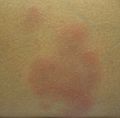Crohn's disease facts for kids
Crohn's disease is a disease that makes your intestines get swollen and sore. It's a type of inflammatory bowel disease (IBD). Sometimes, small sores called ulcers can also form in the intestines.
People with Crohn's disease often feel pain in their stomach. They might also have diarrhea, vomiting, and lose weight without trying. Crohn's can sometimes cause other problems too, like skin rashes, sore joints (called arthritis), and swollen eyes.
The disease is named after Burrill Bernard Crohn, who described it in 1932. But it was first written about by Giovanni Battista Morgagni a long time ago, in the 1700s.
What Causes Crohn's Disease?
Nobody knows exactly why some people get Crohn's disease. We do know that it happens when your body's defense system, called the immune system, mistakenly attacks healthy parts of your digestive tract. This attack causes the swelling and soreness.
Even though the immune system is involved, Crohn's disease is not an autoimmune disease. In autoimmune diseases, the immune system is triggered by the body itself. With Crohn's, the exact problem with the immune system isn't fully clear.
Crohn's disease seems to be linked to a person's genes. If someone in your family, like a brother or sister, has Crohn's, you might be more likely to get it too. Both men and women can get Crohn's disease.
Living with Crohn's Disease
Crohn's disease is a chronic condition, which means it lasts a long time and there isn't a cure right now. People with Crohn's learn to manage it. This often includes making lifestyle changes and taking different kinds of medication. These treatments help to control the swelling and make symptoms better.
Some people try other kinds of medicine, but we don't always know if they work well for Crohn's disease.
Images for kids
See also
 In Spanish: Enfermedad de Crohn para niños
In Spanish: Enfermedad de Crohn para niños
 | May Edward Chinn |
 | Rebecca Cole |
 | Alexa Canady |
 | Dorothy Lavinia Brown |




